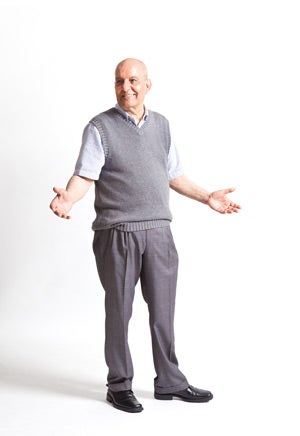Since 2001, University Professor of Sciences and Mathematics Gamil Guirgis has been helping students at the College to understand the finer points of chemistry. We popped into Professor Guirgis’ laboratory and asked the former S.C. Chemist of the Year and Fellow of the Royal Society of Chemistry to share his thoughts on his home country, the pull toward studying chemistry and life in the lab.
Where did you grow up? I was born and raised in Cairo, Egypt. I received my B.S. in chemistry and geology with a double minor in physics and mathematics from Cairo University and M.S. in organic chemistry from Ain-Shams University. Most people are not aware that I have a bachelor’s in divinity from one of the oldest theological schools in the world, which was established in Alexandria in 68 A.D. by the apostle St. Mark.
When you think of Egypt, what images come to mind? In my mind, I see a beautiful and peaceful country and good people; however, the images shown in the newspapers and on the television do not reflect that.
Why did you choose chemistry to study? I can trace my interest in chemistry to when I used to work with my father and brothers in the summer at their shop as a goldsmith. I saw them mixing pure gold (24 carat) with copper and other metals to obtain different gold shades and different degrees
of stiffness.
What is the most important skill for a chemist to have? Chemistry is a dynamic science in a dynamic world and it requires continuous reading and updating knowledge.
What’s your favorite element? Originally gold and platinum were my favorites, but now because of my research interests, I might choose silicon and germanium.
What’s been your greatest professional achievement? It was a very high honor when I was admitted to the Royal Society of Chemistry and received the title FRS [Fellow of the Royal Society].
Which of your 350 published papers is most significant to you? I cannot say that I prefer one paper over the others. All of my 350 papers are like my children, and I love them equally. However, let me put it this way: The best is yet to come.
As an example, my current research project involves the study of the conformation of molecules containing six-member rings. It is well known that a ring of six carbon atoms exists in the chair form, but we found that changing three carbon atoms by three oxygen atoms gives a planar molecule, and replacing the oxygen atoms with three nitrogen atoms (3 NH) gives the boat form. These results are rather contrary
to everything we know.
In chemistry, what’s your particular area of expertise? My interest and expertise are a combination of synthesis, spectroscopy and theoretical calculations (molecular modeling).
Why should undergraduates do research? Like many disciplines that have internships, student teaching and residencies, chemistry uses a research experience to prepare the students for academic, professional and industrial careers.
What’s your favorite part in doing an experiment? To obtain new and exciting results … and to leave the lab in one piece.
What’s one thing the average person should know about chemistry? General chemistry is the foundation of all chemical biology, and this knowledge is important in our daily lives.
Who is one chemist that you believe everyone in the world should know? Me! But seriously, Linus Pauling because he did not limit his studies to a narrow area. He was a Nobel Prize winner, both for his chemistry research and his peace activism. Pauling is considered one of the fathers of quantum chemistry and molecular biology.
For many years, You were a senior research fellow for the bayer Corporation in Charleston. What do you miss most about the private sector? I really do not miss the urgent deadlines, meetings and rigid schedule – but I do miss the money.
What’s your favorite part of teaching and working with undergrads? I strongly believe that my job is to give the students the opportunity to learn. If they respond positively, it makes me happy.
What’s your favorite moment in the lab? When a student obtains good results with a full understanding of the experiment.
What’s the most interesting object in your office? The piles of paper and books brighten my days. But seriously, I have a collection of coffee mugs from around the world. They remind me of places and people.
What’s your guilty pleasure? I rarely see movies (four movies in my entire life); however, I watch TV for local and international news. I read a lot and listen to classical music.
As a fan of classical music, Who’s your favorite composer? Antonio Vivaldi – he wrote The Four Seasons, four violin concertos depicting scenes appropriate for each season.
If you weren’t a chemist, what would you be? I’d imagine that I’d be a goldsmith like every member of my family.





